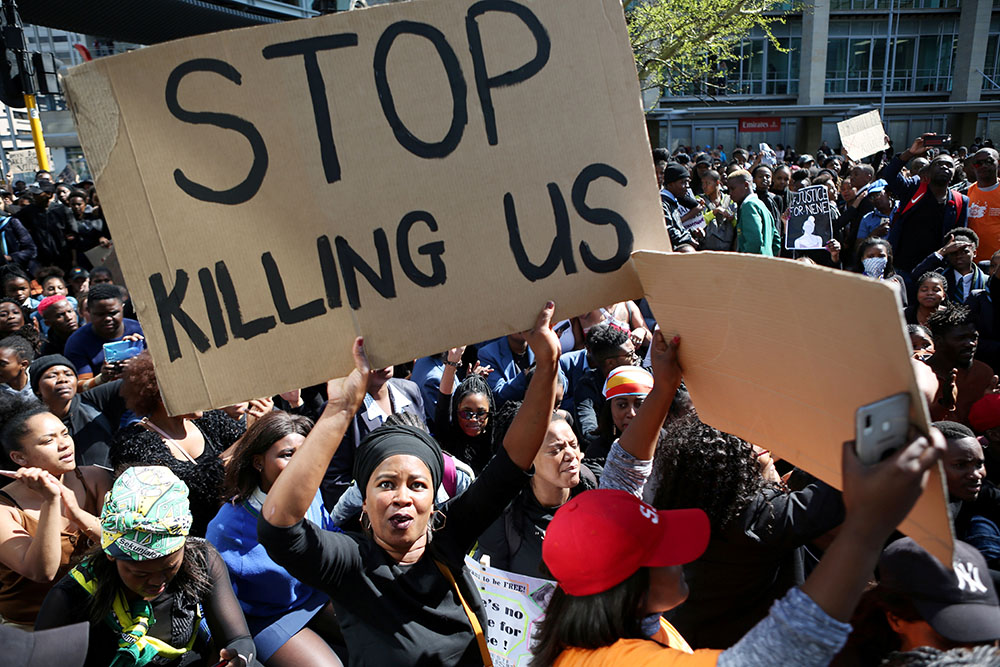
A woman holds a sign as demonstrators gather Sept. 4, 2019, at the World Economic Forum on Africa in Cape Town, South Africa, during a protest against gender-based violence. (CNS/Reuters/Sumaya Hisham)
In South Africa, we have made a lot of progress as a country to achieve gender equality. South Africa's 1996 constitution is one of the most progressive in the world, and ensures gender equality. The post-apartheid state has also attempted to redress the injustices and inequalities of the past through various programs, policies, legislation and entities like the Commission for Gender Equality. The Global Gender Gap Index 2020 ranks South Africa 17th out of 153 countries. This means that we have undergone a more positive gender-empowerment transformation than many developed nations — including Switzerland, the Netherlands, and even the U.S.!
But the socioeconomic challenge of inequality has persisted in the two-and-a-half decades of the post-apartheid era. Women remain undervalued: They work more, earn less, have fewer choices and experience multiple forms of violence at home and in public spaces. In 2017, gender equality was designated one of the U.N. 17 Sustainable Development Goals, but according to the U.N., not a single country can claim to have achieved gender equality today.
Despite the provisions in the constitution, our country has among the highest levels of intimate partner violence in the world. Violence against women is now a "pandemic," making South Africa one of the most unsafe places in the world to be a woman or a girl child.
One woman is killed every three hours in South Africa. Thus, women face quadruple challenges of inequality, unemployment, poverty, and gender-based violence and femicide. For many women and girls in our country, the war zone is not the battlefield — their own homes are, and the war is orchestrated by their own partners or people who are supposed to protect them.
In my ministry as a religious sister, I work with young people and I see this war playing itself out in society. I once ran a vocation workshop in Johannesburg with a group of young girls who belonged to the "Children of Mary" (a sodality of young girls and boys whose objective is to emulate the purity of the Virgin Mary). The girls said that they do not see any virtue in virginity because they are being raped; instead of losing their virginity to some stranger, they would rather lose it willingly to someone with whom they are in a relationship. This left me dumbfounded but gave me an understanding of the intensity of gender-based violence in our society and its impact on girl children.
As a qualified social worker, I do counseling with them. One teen disclosed that she was repeatedly abused sexually by her uncle — who was eventually arrested for a different crime. As in many child abuse cases, the teen never disclosed this abuse to anyone. Upon the uncle's release, he came to live in the same homestead and the girl lived in fear, not knowing when he would strike again.
She started engaging in self destructive behaviours, like cutting herself and overdosing on painkillers. When these strategies failed to give her relief, she used substance abuse and later became involved with an abusive man. She would end up in hospital but would drop the charges against him, and stay in the relationship because it was a momentary escape from her uncle.
She thought she was damaged goods, that no one would want her, and she deserved to be beaten up by this man. With no desire to live, she had lost all hope in the very structures that were supposed to protect her — especially her family.
Advertisement
The impact of gender-based violence on the life and future of girls who are raped or sexually abused is just unimaginable. In the words of this teen: "My life used to be like a beautiful vase before the abuse, but then the vase fell with the abuse and was shattered into small pieces, and no matter how many pieces are retrieved and put together again, the vase will never be as beautiful like it was before it was broken. So, no amount of counseling or therapy can help me find nor put back all the pieces of my precious life together again."
If our girls are subjected to such violence and trauma, we are creating a society that is even more wounded. History is going to judge us harshly by how we failed to protect the most vulnerable in our society, women and children.
During the lockdown, I assisted in the Gender Based Violence Command Center, where one of my clients reported that she had to run away to her mother's place with her children because of repeated abuse from her husband — who threatened to kill her and was now stalking her. We had to help her obtain a restraining order against him.
Due to the lockdown, courts were only operational at certain times, as was public transport. That meant she could not be helped immediately, which made her feel even more unsafe.
She worried about the impact of her abuse on the children; the oldest boy threatened to kill the father should he see him near his granny's house. Thus the consequences of gender-based violence go beyond the victim; children suffer emotional damage from watching their mother being battered; the family structure is threatened and may be broken. The young boy is internalizing violence as a way of dealing with conflict, and a vicious cycle of generational violence may be reproduced and perpetrated.
A recent study by UN Women found that reports of violence against women, and particularly domestic violence, have increased in several countries as tensions and strains are accentuated by the confined living conditions of lockdown. Between June 1-18 this year, 21 women and children were brutally murdered in South Africa by their partners or people known to them.
U.M. Secretary-General António Guterres noted that COVID-19 could reverse the limited progress that has been made on gender equality and women's rights as "the pandemic is deepening pre-existing inequalities, exposing vulnerabilities in social, political and economic systems which are in turn amplifying the impacts of the pandemic."
Gender inequality and patriarchal norms are root causes of violence against women and children, as the primary cause lies in unequal power relations between women and men, ensuring male dominance over women. Our dehumanizing apartheid past also plays a role in perpetuating gender-based violence by institutionalizing violence as a normal way for dealing with conflict or expressing anger — leaving a lot of woundedness behind.
Substance abuse is another leading factor in the scourge of gender-based violence and femicide. South Africa has among the highest levels of alcohol consumption across the globe.
Another contributing factor is the phenomenon of absent fathers, leaving children with a sense of rejection and woundedness. Research conducted by the Human Sciences Research Council and the South African Race Relations Institute over a period of five years showed that 60% of South African children have absent fathers.
To eradicate gender-based violence and femicide, we need to uproot gender inequality. We (including men) need to address toxic masculinity. We also need to address the wounds caused by apartheid, as we will have more woundedness due to the coronavirus.
The time to act is now; Generation Equality starts now! It is up to you and me now to be change agents by being part of the generation that ends gender inequality and gender-based violence by saying enough is enough! Until all women can feel safe in their own homes and society, you and I cannot be free. #IAmGenerationEquality!
[Nkhensani Shibambu is superior general of the Congregation of the Companions of St. Angela, which is a diocesan congregation based in Johannesburg, South Africa, and she serves as president of the Leadership Conference of Consecrated Life in Southern Africa. She is a qualified social worker by profession and is passionate about youth ministry.]







